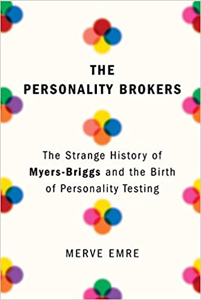 Merve Emre, The Personality Brokers: The Strange History of Myers-Briggs and the Birth of Personality Testing (New York: Doubleday, 2018), 307pp.
Merve Emre, The Personality Brokers: The Strange History of Myers-Briggs and the Birth of Personality Testing (New York: Doubleday, 2018), 307pp.
Everyone seems to have their own Myers-Briggs story. I have several, but here's my favorite one. I once saw a guy with a tee-shirt that had a square on the front that was divided into four quadrants, in which was his four-letter MB acronym. No descriptor was needed, for almost anyone who saw those four letters knew what they meant.
Today the "Myers-Briggs Type Indicator" (it's not a test!!) is the most popular and influential personality inventory in the world, and even what Merve Emre calls "a mass cultural phenomenon." Everyone uses it: Fortune 500 companies, prisons, churches, university admission departments, the American Bar Association, therapists, medical schools, the CIA, and, I learned in this book, even my local school district when it was deciding which students got admitted to its "gifted" program. But it wasn't always that way, and to call the history of the MBTI "strange" is, as Emre shows, a gross understatement.
The MBTI was the brainchild and lifelong passion of Katherine Briggs (1875–1968) and her daughter Isabel Briggs Myers (1897–1980), neither of whom had any professional expertise in psychology or testing. The MBTI began with what Katherine called her "cosmic laboratory of baby training" in her home, a rigorous program that subjected her daughter Isabel to personality typing. Katherine had a pronounced obsession with Carl Jung and his book Psychological Types (1921). She corresponded with Jung, wrote poetry to and about him, and met him in New York for a private session. Eventually, and with help from Isabel, she expanded and developed a crude popularization of Jung's original eight types into the current MBTI sixteen types.
Emre explores a delicious paradox. How can something so scientifically dubious, ethically irresponsible, and philosophically problematic, become so wildly successful (a $2 billion a year global industry), and, let it be said, genuinely helpful to millions of people? The many and very real problems with the MBTI are by now well known, resulting in all sorts of articles that debunk it, like "The Mysterious Popularity of the Meaningless Myers-Briggs." Nonetheless, the anecdotal evidence is also overwhelming about how the MBTI has helped millions of people in the areas of self-understanding, the acceptance of differences, miserable marriages, vocational satisfaction, etc.
The MBTI might be what Emre calls "an irresistibly attractive fiction," and not much better than your horoscope (224), but she never condescends to her subject matter. In fact, she started researching this book with a critical mindset, but eventually changed when she had her first baby and started wondering about the emerging personality of that little infant. And so she dedicates her book to "the skeptics, the true believers, and everyone in between. Which is to say that this book is for you: you who cannot, and should not, be typed."
Merve Emre is an associate professor of English at the University of Oxford and a fellow of Worcester College. The Personality Brokers was one of the 2018 NYT "best books of the year."
Dan Clendenin: dan@journeywithjesus.net


